Clive Fitts
Recollections, 1919
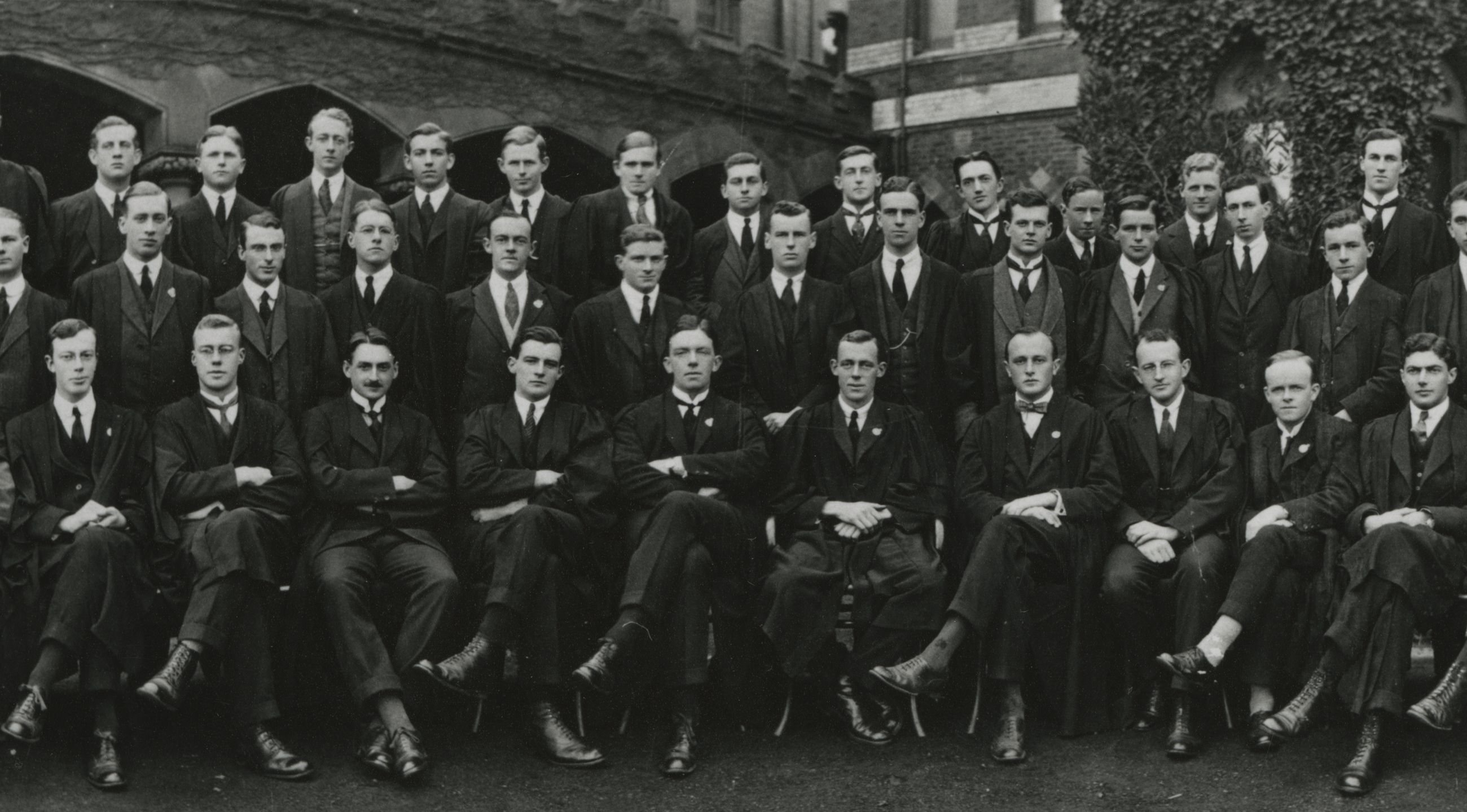
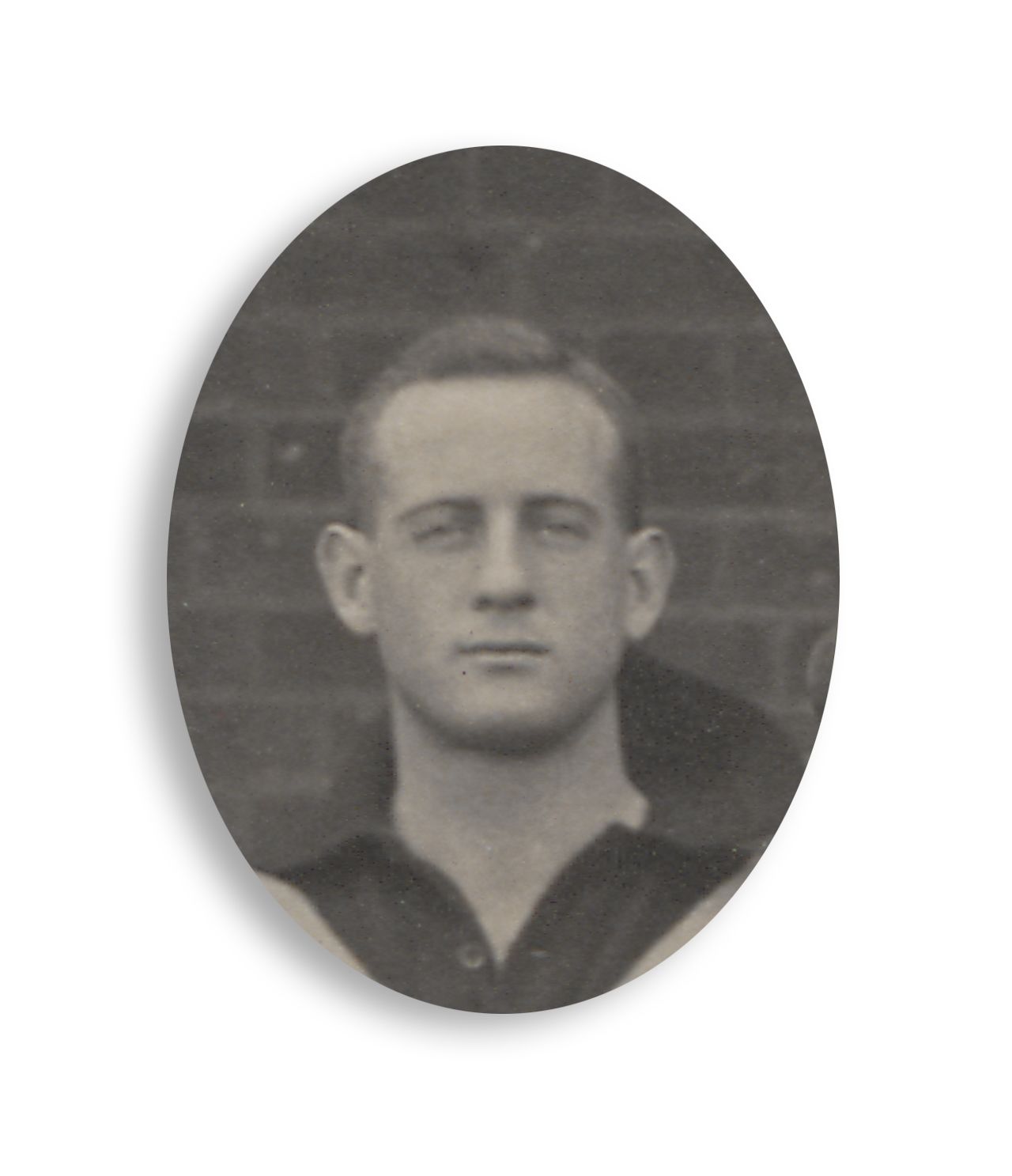
Clive Fitts (TC 1919) on the 1922 Trinity football team
Clive Fitts (TC 1919) on the 1922 Trinity football team
'Old men dream dreams and perchance see visions and young men take colour photographs.'
Clive Fitts was born on 14 July 1900 in Carlton, one of five children to wool merchant Hamilton Fitts and wife Catherine. He followed his two older brothers to Scotch College, enjoying eight 'carefree' years before coming into residence at Trinity College in 1919. It was a unique time to be at Trinity. Alexander Leeper had just retired after 42 years as Warden, and alumnus John Behan (TC 1903) commenced as his successor. Fitts' association with Trinity would be life-long. He was married in the Chapel in 1939, and encouraged the Warden to establish the position of resident medical tutor. A gifted speaker and medico, he was active in the fine arts. He was on the board of Melbourne University Press, and was founding president of the National Gallery Society (1947) and the Felton Bequests Committee from 1955, and served as chairman from 1965-75.
I have been asked to write about College life in my day, and as I have only one photograph, the College group of 1919, I shall have to conjure up the past. Today I can still stand by the oak, with my back to the Behan building and see, in Clarke's and Bishops', the physical shape of the College as I knew it. I can people the studies with the men I knew, and I can echo Browning's:
'What's become of Waring
Since he gave us all the slip?'
Under the oak at lunch-time we lazed in the heat of late summer if the billiard table was engaged; in the late afternoon every day of the College year we played at some form of sport.
1919 was a unique year in which to come up to College, for if the University went on its accustomed way during the war, this was not so with Trinity, which was at a low ebb, financially embarrassed and with its future in jeopardy. There were three groups of people in residence that year: the seniors, some of whom had returned from the war at an earlier date; the returned servicemen, who were freshmen either beginning, or resuming their University course, and I doubt if there has ever been a group of freshmen of comparable age, experience and sophistication; the third group comprised those like myself who had come up fresh from school. The freshmen outnumbered the seniors, and I have sometimes pondered why we did not initiate them rather than the reverse.
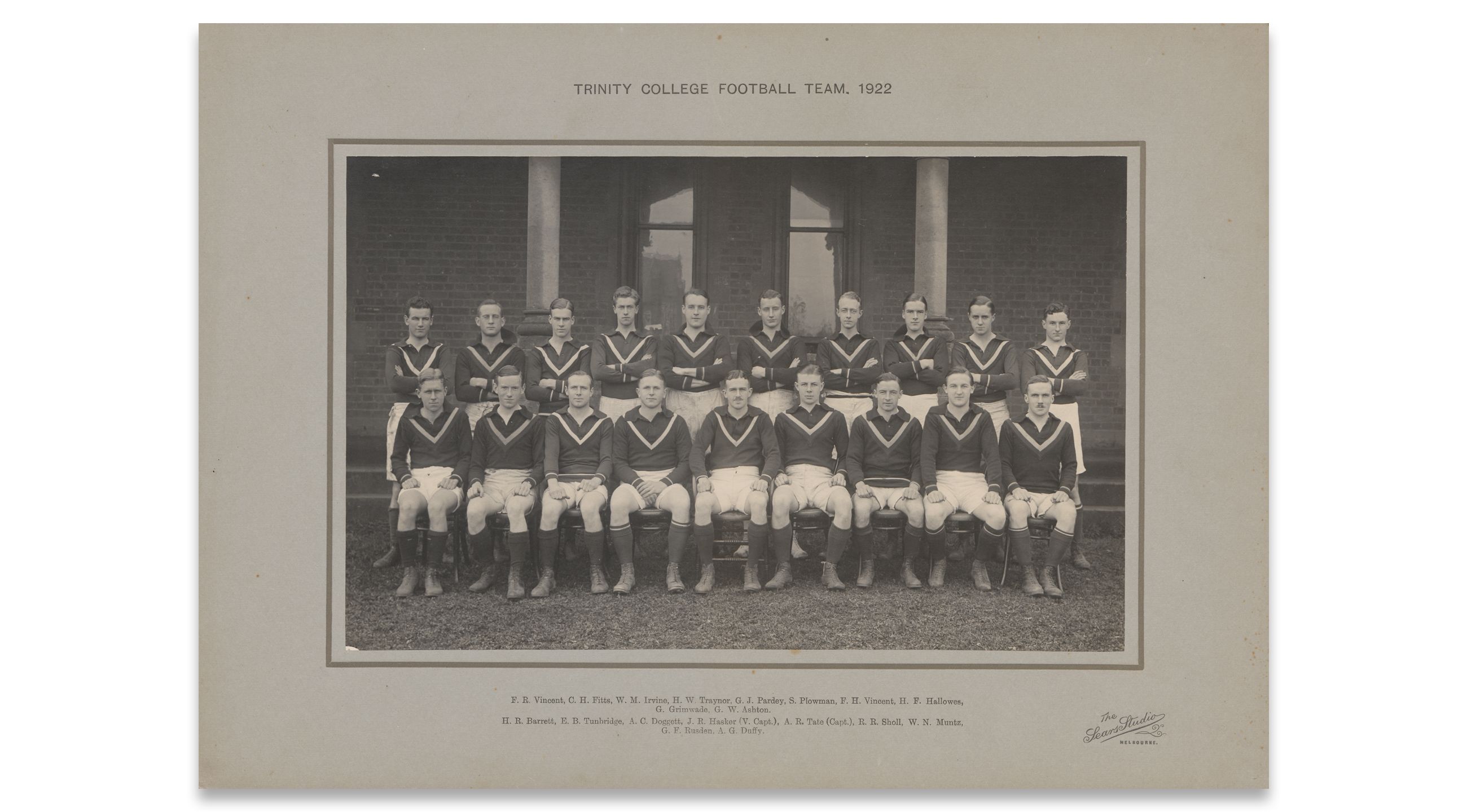
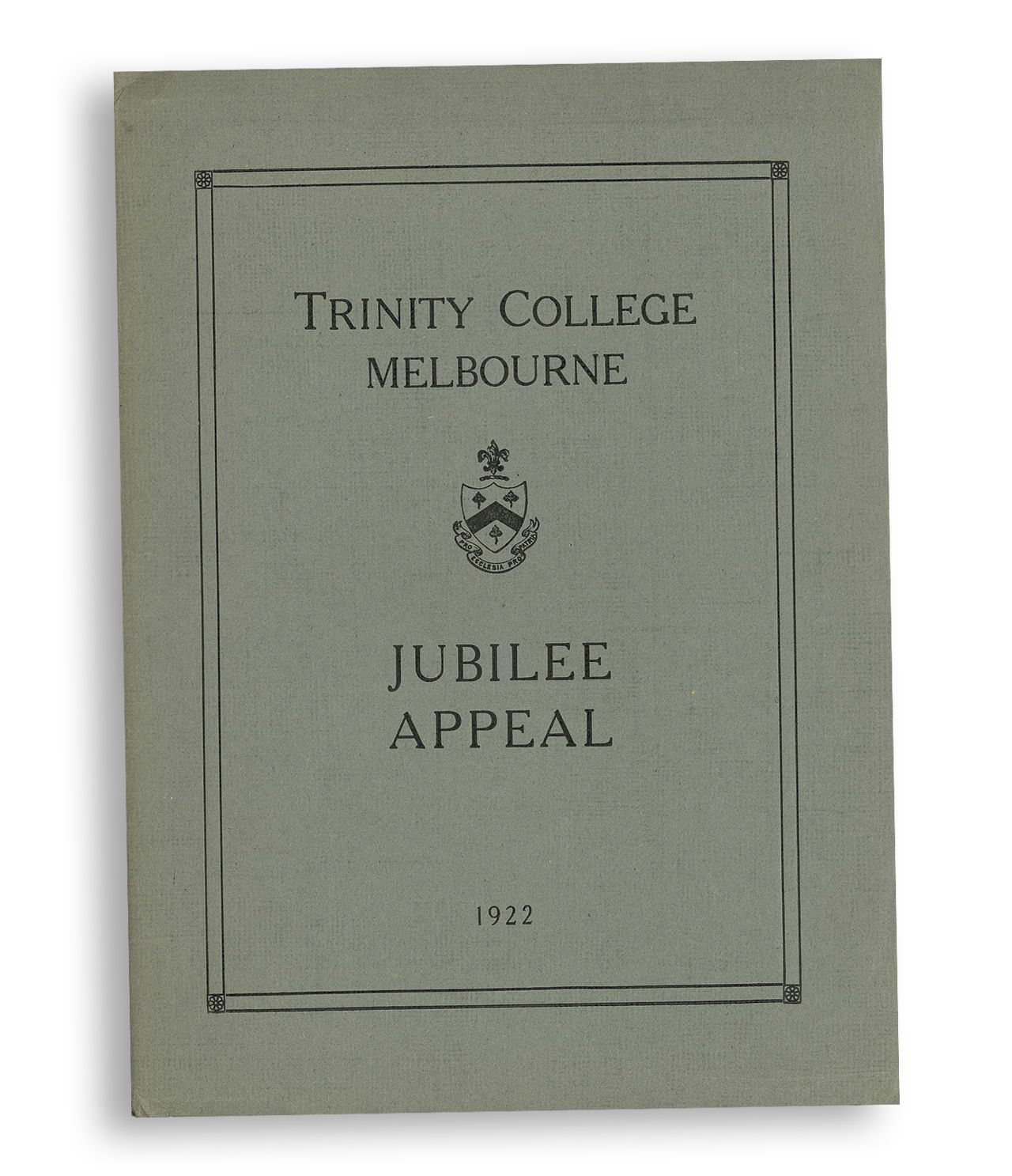
Promotional booklet for Trinity's 'Jubilee Appeal' in 1922
Promotional booklet for Trinity's 'Jubilee Appeal' in 1922
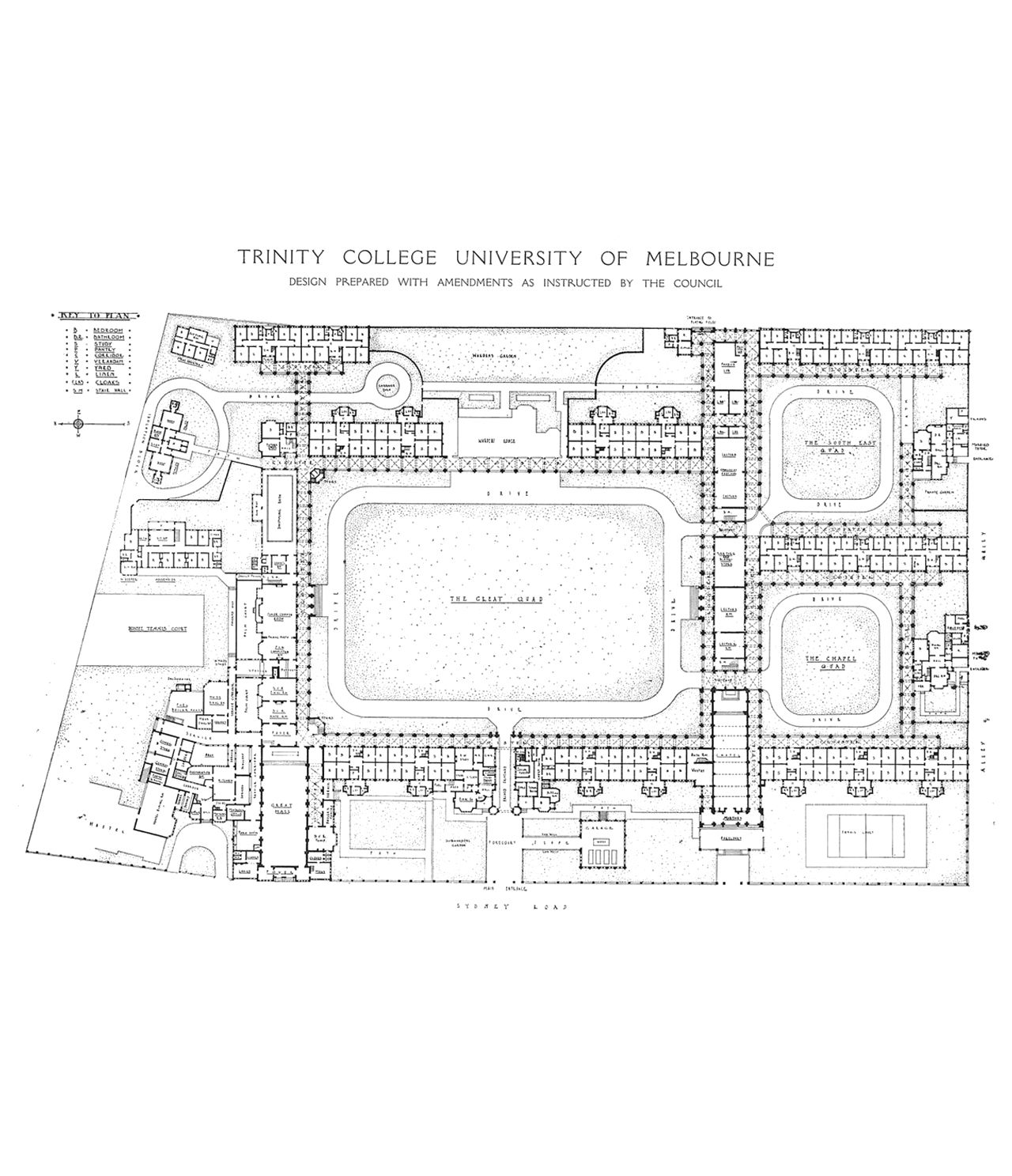
Trinity's post-war 'master plan' of 1920, which would guide the college's strategic division for much of the interwar years.
Trinity's post-war 'master plan' of 1920, which would guide the college's strategic division for much of the interwar years.
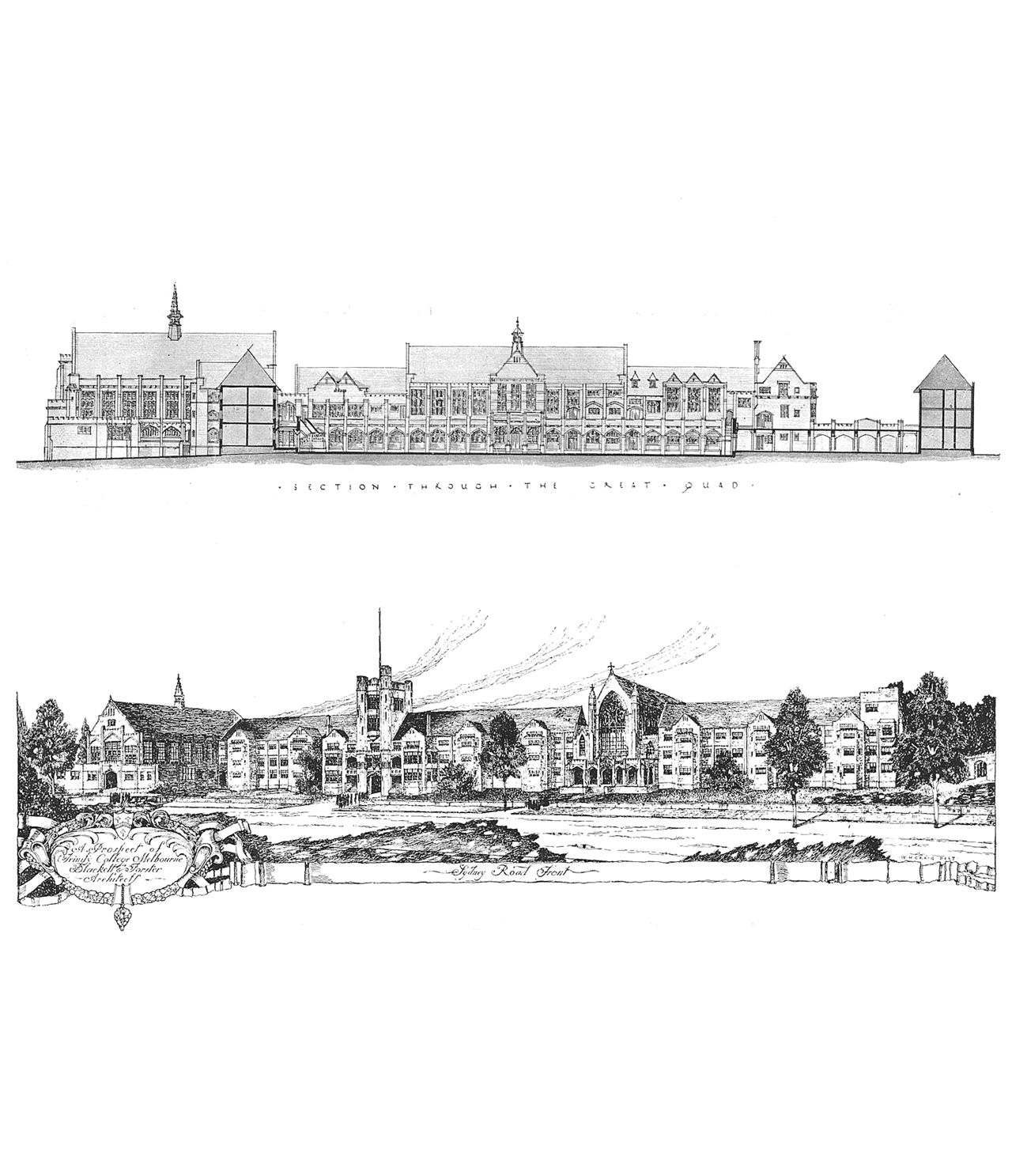
Trinity's post-war 'Master Plan' of 1920, which would guide the college's strategic division for much of the interwar years.
Trinity's post-war 'Master Plan' of 1920, which would guide the college's strategic division for much of the interwar years.
There are 61 men in the 1919 photograph, and this number made for an intimacy that must inevitably be lacking when the numbers increase. There was much to do and nearly everybody played a part in College life and participated in College sport. We ran, swam, rowed, played football, cricket and tennis, and on the whole did not add lustre to ourselves or the College.
Most of my group were not concerned with success beyond the modest attainment of a pass either in the annual examinations or in the 'supps', which were freely available and very helpful.
It is alleged that Australians do not know how to use leisure, but this was not evident in Trinity.
Curiously enough, College life was more hazardous for the Honour students than for us, for though we could repeat a year, failure to obtain satisfactory honours might mean loss of a scholarship and of a place in College.
We had supper at 10 o'clock each night and, except on special occasions when we had home-made cream cakes and short-bread from the Misses Gray across the Sydney Road, everybody drank cocoa made with condensed milk and ate biscuits. If the fare did not vary the conversation certainly did.
After the initiation ceremony was behind us, we freshers were invited by senior students to supper. One who had never left home before, found himself in a new world among people intellectually more mature, even if they were not many years older; more worldly wise, tempered in battle and trench warfare and in the lighter side of life in Paris and the West End of London and the bazaars of the East. It was a heady, intoxicating world for a schoolboy freshman, and not less so when on an occasion someone would have a crate of beer from the buttery for a party. The crates were really the baskets for fire-wood kept in every study.
But our nightly discussions were not always on the seamy side of soldiering, and our friends at Monash University will be glad to know that atheism, agnosticism and rationalism had their champions in an Anglican foundation 40 years ago. How our minds were fired by the unanswerable logic with which F— demolished Christian belief; how nobly he fought for freedom of thought and for the abolition of compulsory Chapel attendance not, as he modestly said, fighting for himself, but for the College.
Here was a man to worship; one who had come unscathed through the war, who had savoured life to the full and who seemed to charm everyone but the Warden. Alas, he went down from College after three years and took his tarnished glory with him and we small fry still went to Chapel. Twenty years later I met him, still debonair, still without his degree, and with the same altruism offering me the chance of coming in on the ground level in a gold mine which I later found never went any deeper.
The Trinity College Social Club might well be said to have run the College in most respects, and the meetings were conducted with an efficiency and a regard for procedure which, having endured countless committee meetings since, still command my respect. The range of discussion was wide but never unduly prolonged or tedious. Was it the shape of things to come?
I remember one of the senior medical students gave a light dissertation on the height and shape of the College sanitary bowls and the circumference of the seats. He is now the Director-General of Health in New South Wales.
If we fledglings were beset by the distractions of argument, of sport, of the buttery, of gambling both at cards and races, and indeed of working while sharing a study with someone who wanted to improve his billiards, with few exceptions we were spared the entanglements of the Hostel, which only became Janet Clarke Hall in 1921.
The inmates of the Hostel were known as Hostiles, and I fear it was with hostility that they were treated and the occasions on which any of them came into College were rare. I have met many of them in later years and realise that perhaps we missed something from the Hostel that exists today between Trinity and Janet Clarke Hall.
We mingled freely, however, with the men of Ormond, Queen's and Newman, and it would be no exaggeration to say that, in the absence of an effective students union, the corporate life of the University resided in the colleges.
In weekends or vacations or in the last weeks of the academic year the College took on a different air, and one could be curiously alone. It was in the solitude of a Sunday afternoon that I found the Leeper Library in which subsequently I spent many happy hours.
As I look at the 61 faces in the photograph I count 28 medical students. Of these there are five whom one would regard as honours students and three of them chose to become general practitioners. None of the five was in the freshman year, and it is a fact that we had little idea how to work for examinations, which may be better than having too much.
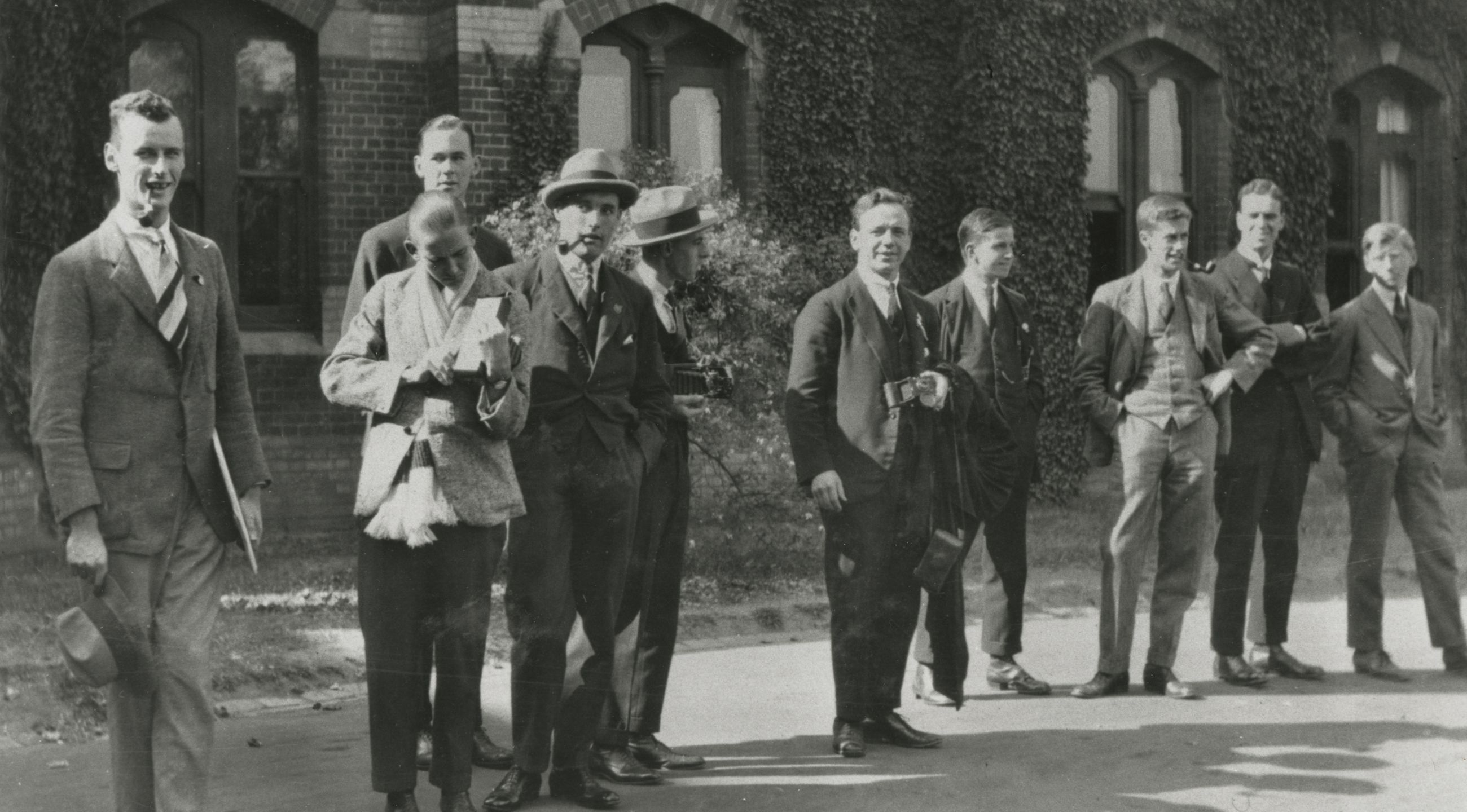
My study-mate was doing law, and it was commonly said that I knew more law than he did and he knew more medicine than I. As a doctor he would have been before his time, for even then he had an encyclopaedic knowledge of proprietary remedies which are now known as 'ethicals. As a lawyer taught by my College wife the importance of knowing the leading cases, I have to confess that I remember only Malone v Lasky. The widow Malone had influenced my life, and there are moments still when I look up at the thought of her. I hope that this is still a leading case and that it is listed in the law reports, for it throws a light not only on legal procedures, but on human nature, and the diversions of a medical student in College.
The academic year was slipping away and we paid little heed, for we freshmen had accepted without question the College tradition that work began in earnest when the oak came into bud, and we waited for the sign.
Perhaps it was late that year, and under the liberal system then prevailing we decided to concentrate on two subjects and leave the other two to the supplementary examinations. It was a nerve-wracking process that some continued throughout the course, but the loss of the long vacation working for supps brought its reward in the second year.
Lacking ambition and with no examinations to face until August of the third year there was a timelessness about College life that I look back on as something infinitely precious.
We drew from those days more than from any others enduring friendships with people who have followed many different vocations; and our lives have been enriched by our association with Trinity.
Remembrances of Clive Fitts (TC 1919), provided back to Trinity College in 1961.
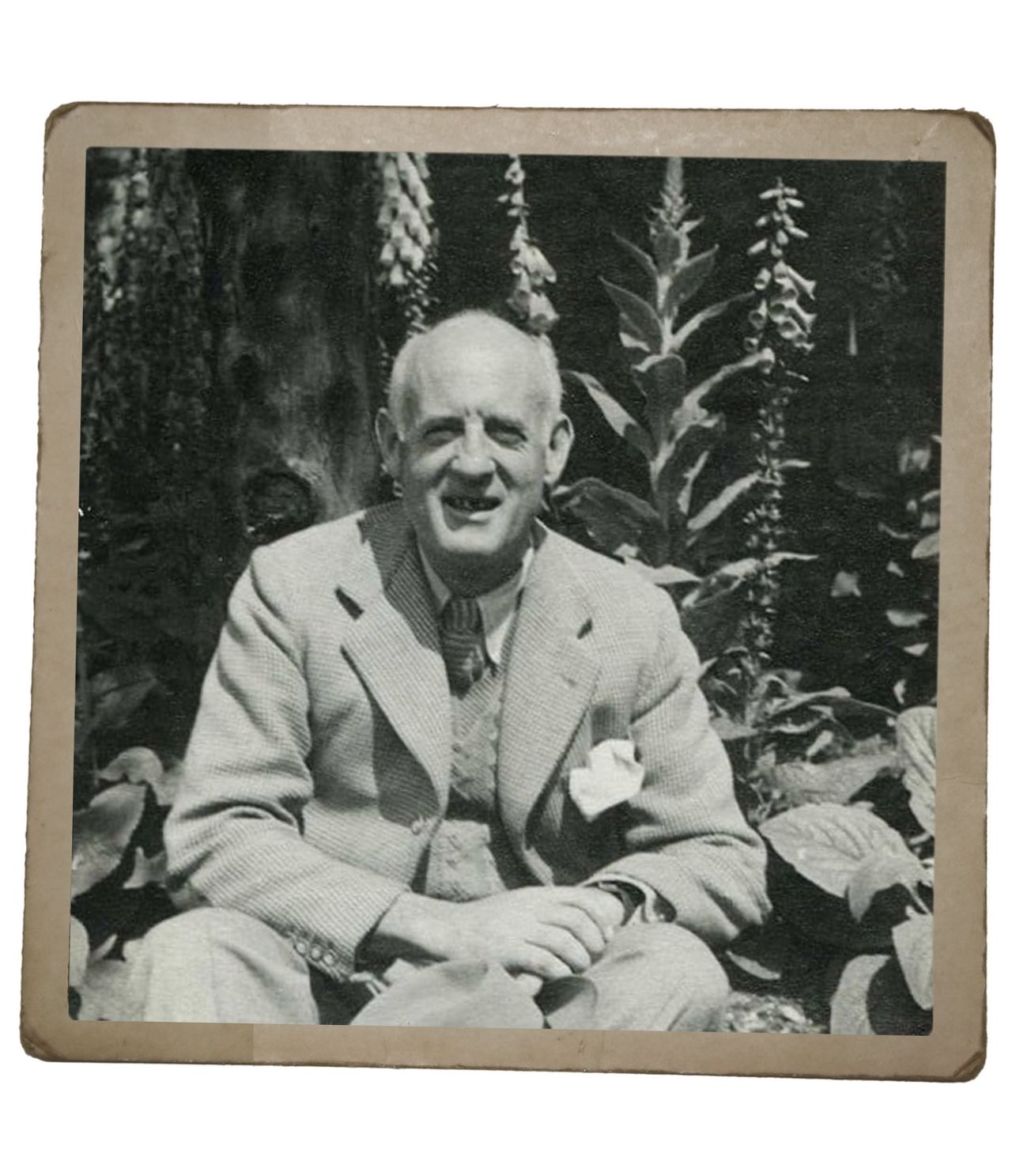
Sir Clive Fitts. Image courtesy of the Royal College of Physicians
Sir Clive Fitts. Image courtesy of the Royal College of Physicians
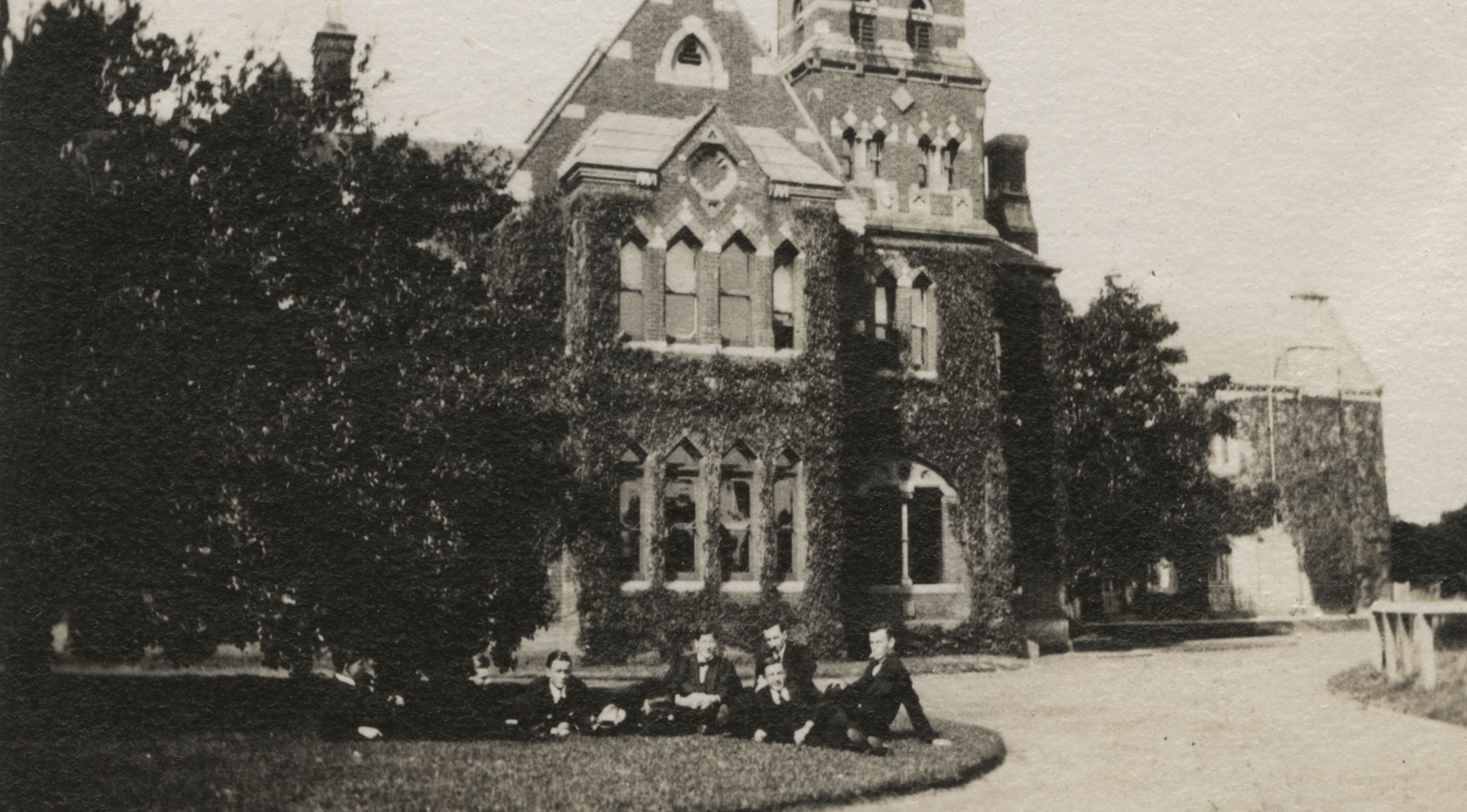

Dr Ben Thomas, Rusden Curator, Cultural Collections
Dr Ben Thomas, Rusden Curator, Cultural Collections





